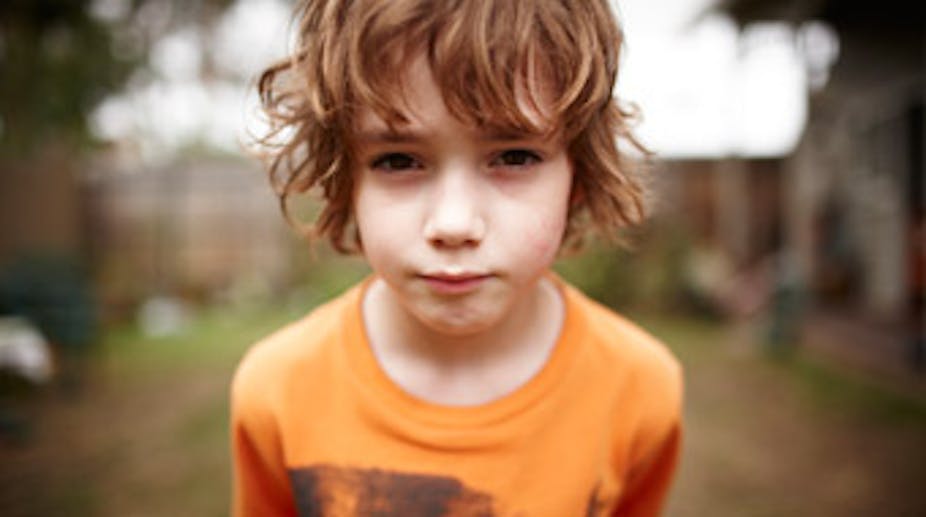In last night’s ABC program, The Slap, an impulsive slap changed everything. A man struck someone else’s child at a barbecue provoking a legal challenge. In real life, that would be an assault, though it might be dismissed at trial. But in real life we allow children to be assaulted by their parents.
As in Christos Tsiolakas’ controversial book, the program showed the complex web of disapproval the character faced when he slapped someone else’s child, but if the child had been his own, it would probably only have raised a few eyebrows.
Australian law
The law is clear: a boss slapping her PA, a teacher hitting a student, a childcare worker slapping a child in her care would be an assault in Australia.
But a parent slapping his or her child wouldn’t reverberate at all.
In Australia the only category of victims who can lawfully be assaulted is children, by their parents. There is no defence for a boss, a teacher or a child care worker. There is no defence for a husband – domestic violence is now named and criminalised.
But parents slapping their children are almost certainly not committing assault. Parents can raise the defence of “reasonable chastisement” if they hit their child to discipline them. Only if parents’ behaviour is excessive - “unreasonable” - will they be charged with assault.
In several areas of Australia, including the ACT and Tasmania, there have been calls for abolition of the defence, but no government has taken the step as yet.
International law
Almost all United Nations countries, including Australia, have ratified the Convention on the Rights of the Child, which requires signatories to “protect the child from all forms of physical or mental violence … while in the care of parents”. Interestingly the only two not to have ratified it are Somalia and the USA.
Thirty countries have now banned physical punishment by parents, by abolishing the “reasonable chastisement” defence.
The first was Sweden, in 1979. New Zealand abolished the defence in 2007 and most recently Poland, Tunisia and Kenya changed their laws in 2010, and South Sudan in 2011.
The UN Committee on the Rights of the Child has criticised Australia for continuing to endorse parental physical discipline, as has the UN Committee Against Torture.
What does it achieve?
The most recent international research consistently shows that physical punishment does not achieve what the disciplining parent wants.
According to Elizabeth Gershoff and Andrew Grogin, it does not increase a child’s internalisation of moral values or compliance (except perhaps whilst the parent is physically present). And it does not reduce aggression or anti-social behaviour.
It is, however, linked in a number of studies with physical abuse by parents of their children – what may start as mere discipline can tend to escalate.
It is associated with an increased risk of the child being anxious, depressed, and becoming an abusive partner and parent in later life.
The purposeful use of violence by a person the child loves and trusts creates inevitable and sometimes long-term distress.
More broadly, physical discipline, and laws that allow it, breach children’s rights to be treated – like everyone else – with respect for their physical and emotional wellbeing and to equal protection of the law.
The law should change
Removing the “reasonable chastisement” defence simply brings physical discipline of children into line with physical violence towards domestic partners, employees and everyone else.
Clearly a criminal law prohibiting physical discipline will not stop physical discipline by itself. We’ve had laws prohibiting murder for millennia.
What criminal laws do, at a symbolic level, is to spell out what our society values. This is central to law reform in this area. They also, however, aim to change community values, and to deter harmful behaviour by the threat of punishment.
Changing attitudes
And attitudes change: In the 1960s in Sweden most parents hit their preschool children occasionally to regularly, but by 2006 only 13 to 14% of middle-school children reported ever being smacked.
As Janson, Langberg and Svensson put it: “In the 1960s, corporal punishment was seen as a justified and useful tool in bringing up children; today most parents look upon such behaviour as deviant.”
The New Zealand example
In New Zealand the abolition of the “reasonable chastisement” defence was controversial, but it also explicitly retained a parent’s right to use force to stop the child being harmed or from causing harm or disruption. It also allowed for “normal daily tasks… incidental to good care and parenting”.
These are all important areas of parenting, which parents often fear will be lost if the ‘right’ to discipline is abolished.
The legislation also takes into account the usual common law position that police should continue to have the discretion not to prosecute where the matter was “so inconsequential that there is no public interest in proceeding”.
In fact very few prosecutions have occurred in New Zealand for physical discipline.
Appropriate prosecutions
This is quite appropriate as the Committee on the Rights of the Child commented that, “prosecuting parents is in most cases unlikely to be in their children’s best interests”.
The aim of such reforms is to “stop parents from using violent or other cruel or degrading punishments through supportive and educational, not punitive, interventions.”
In The Slap, the judge has to decide whether the punishment Harry meted out to his friend’s child was a breach of the law or not.
But until parental discipline causes as much controversy as this fictional slap, we will continue to breach children’s rights and our criminal laws will undermine their wellbeing and importance in this country.
The Slap airs on ABC1 on Thursdays at 8.30pm.

